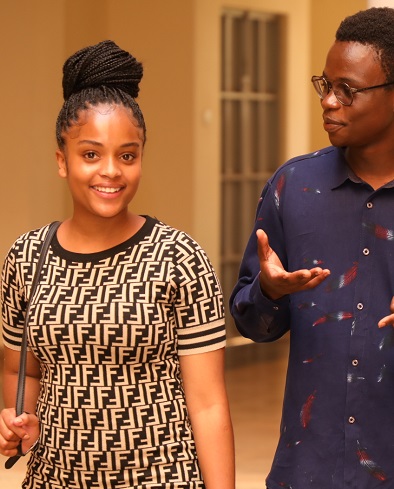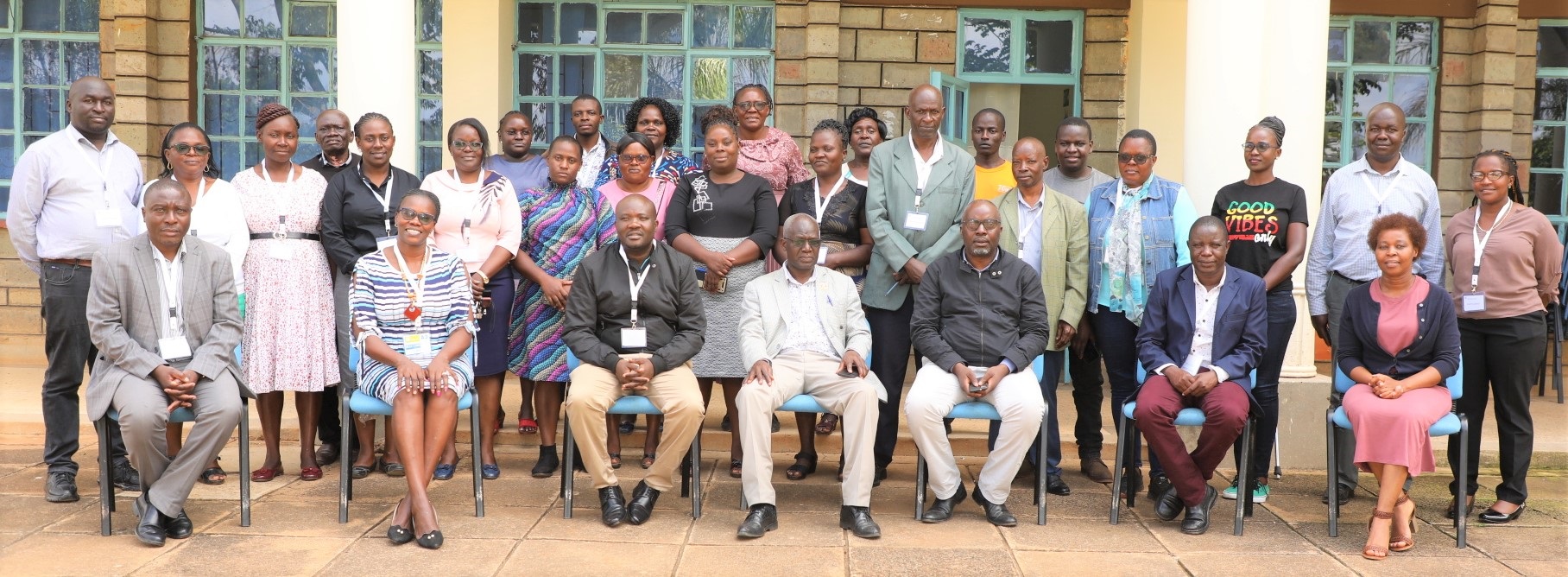The participants of the workshop.
A team of researchers from Masinde Muliro University of Science and Technology (MMUST), has advocated for Early Childhood Development (ECD) as a powerful equalizer to Climate Change. This was during a dissemination workshop held on 16th June 2023 to impart knowledge on climate change to primary school teachers and ECD trainers. The purpose of this workshop was to empower the teachers with skills that will enable them to integrate climate change aspects in teaching early learners using creative arts. The workshop was organized by the project’s Principal Investigator, Dr. Rose Opiyo.
The workshop showcased an overarching framework on concrete approaches in the intersections of ECD, climate change, and environmental degradation. It highlighted key regional partnerships and efforts to mitigate the crisis.
Speaking during the event, the Dean of the School of Disaster Management and Humanitarian Assistance (SDMHA), Dr. Nabiswa noted that young children need to be at the center of climate and environmental responses as potential agents to revert the crisis.
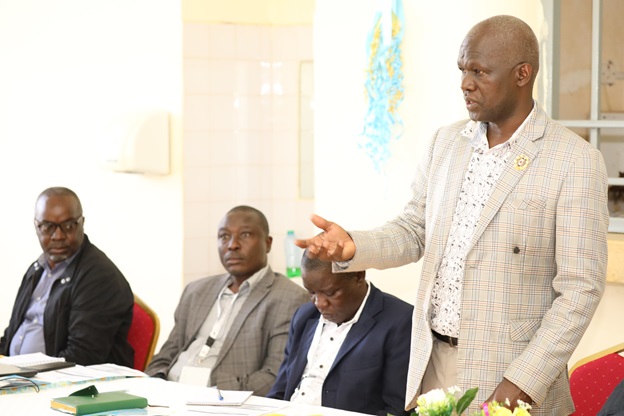
The Dean of School of Disaster Management and Humanitarian Assistance (SDMHA), Dr. Nabiswa, making his remarks at the workshop.
“As researchers, we need to build the capacities of key stakeholders to be able to articulate ECD as a climate-friendly investment and a solution to climate resilience. I am glad to work with the School of Education (SEDU) in elevating the climate change situation through creating informative awareness,” said Dr. Nabiswa. His remarks were echoed by his counterpart, Dr. Edward Mugalavai, who added that there is a need to mainstream ECD in climate resilience and adaptation.
According to the presentation made by Dr. Opiyo titled ‘Empowering the Young Climate Guardians: Unleashing the Potential of Creative Expression and Knowledge in Children’s Contribution to Climate Change Mitigation’, investing in equitable, high-quality, well-financed ECD policies, programs, and practices can foster the developmental potential of young children as the most valuable stewards for a sustainable future.
“The outcome of the survey that we carried out showed that 2.8M children under age 18 are most vulnerable to climate change. Vulnerability varies by age, geography, gender, and disability. The purpose of this project is to empower youngsters, parents, and guardians in unleashing the potential of creative expression knowledge in children’s contributions to fighting climate change. Climate change is a global threat and our children hold the key to a resilient future. It's time we give them the tools they need to succeed,” she stated.
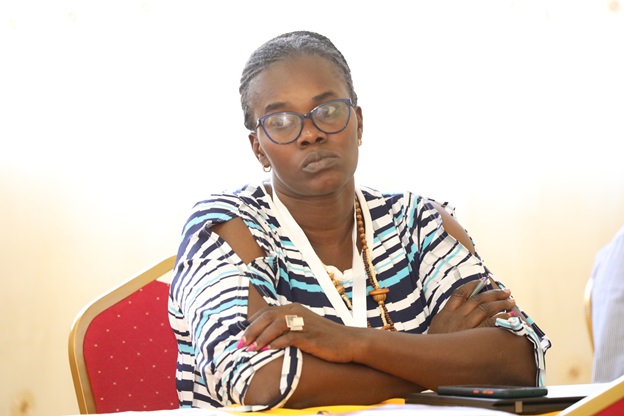
Principal Investigator, Dr. Rose Opiyo following a presentation at the workshop.
Additionally, the Manager- African Early Childhood Network, Mr. Moses Abiero explained that their role is to champion excellence and collaboration in protecting children’s rights, influence policy and practice, strengthen partnerships, and share experiences and knowledge in ECD on the African Continent. He noted that Africa has the worst climatic impacts that have exposed children to major climate and environmental hazards, shocks, and stress thus causing various diseases.
“As AFEC, we are advocating for a partnership in early childhood development and climate resilience at all levels. I recommend the University to continue reaching out to youth advocates who are spreading knowledge on climate change, implementing policy dialogue to strengthen the ECD workforce development,” said Mr. Abiero.
Dr. Chrispinus Wasike explained that what makes artwork creative is that it is unique, has aesthetic appeal in nature and it has powerful impacts. He added that the benefits of creative arts are that it expresses the message clearly, allow self-expression, allows one to connect with their emotions and feelings, and enables learning and understanding.
“Creative art intervenes in climate change dialogue through various actions like; Climate Change in arts where an institution creates a corner for climate-related arts, climate engagement with arts, and climate engagement through art which can be embraced through drama festivals,” said Dr. Wasike.
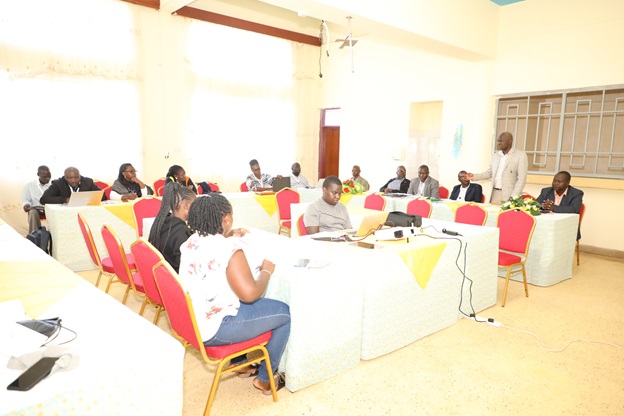
A section of the participants.
Presenting at the workshop on ‘Environmental Natural Resource and Climate Change’, the Director, Natural Resources-County Government of Kakamega- Mr. Antony Munanga, stressed the need to build capacity for mitigation of Climate Change effects.
Mr. Munanga urged the participants to work with other organizations and communities in the fight against the crisis. He highlighted some of the effects of climate change on children which included; health issues, malnutrition, food and water insecurity.
Commenting at the workshop, his counterpart, Mr. Justin Mutobera said that climate change has led to malnutrition and undernutrition in developing countries leading to diseases caused by rats (zoonotic) due to the destruction of natural habitats. Climate change has caused the emergence of invasive species (fall armyworms), the disappearance of some species like plants, and insects, species migration, prolonged drought caused by dry spells, and changes in planting seasons.
“COP26 has recognized the importance of creating climate change awareness. Therefore, the elements of ACE are crucial since they emphasize global response to climate change. The County Government, is working on the gaps that need mending and also we have implemented an afforestation program, participation of school children in observation days’ significance to climate change”, he said.
The voices of young children remain the most underrepresented in most of the decisions fora. This workshop presents us with a unique opportunity to shift the current predominant narrative that focuses on children as victims towards children with vital voices with the potential of becoming strong contributors in matters of Climate Change Mitigation.
By Linet Owuor and Milicent Masitsa


